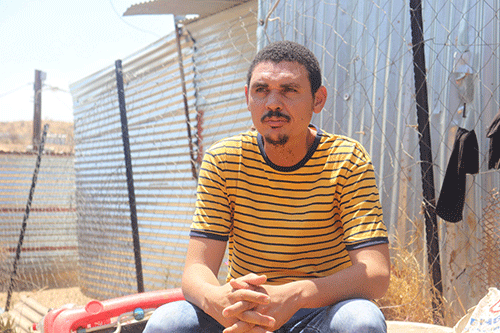Legendary producer Elvo Diergaardt, the man behind numerous Namibian hits and who has shaped the country’s most recognisable musical talents today, has fallen on tough times.
“People think I’m living a lavish lifestyle because of the work I have done in the past. I just want to be as honest as possible. I used to work for the College of the Arts about three years ago as a part-time lecturer, but got retrenched when Covid-19 hit us,” he stated.
Diergaardt decided not to suffer in silence, and wanted to put an end to the façade which some celebrities put up that all is well. He thus recently invited New Era’s Industry Loop podcast team to into his home, where he revealed his dire living conditions.
He currently lives with his wife, Cornè, and four children in a shack dwelling in Otjomuise 8ste Laan in Windhoek, which is in stark contrast to the many houses he used to rent in his heyday, including a five-bedroom house some 10 years ago.
Dr Mavovo, as he is passionately known in music circles, said his biggest concern is a place to stay permanently and build his studio, regardless of the area.
“Where we are now staying is my wife’s father’s place, from where we must move next year in February. I’m from Rehoboth, where my mother hails from. But now I have my own family that I have to take care of; I can’t burden my mother with that.”
Diergaardt narrated that after his retrenchment, things started going downhill for him as employment opportunities dried up and artists shied away from working with him because of the set-up he has in the informal settlement.
“I helped start other people’s studios, and have been giving my CV to maybe 20 companies. But nothing concrete has come out of it,” he said of his attempts to get another job.
He remarried this year after a divorce, which saw his now ex-wife get half of the business – Lash Attraction Studio – which they were sharing.
“After the divorce, I lost the business and could not continue with it after that. So, I had to start from scratch, and the business was not the same anymore. I don’t want to involve my past, as this is not the reason why I invited you here. I also don’t want to talk about my ex-wife, whom I very much respect because we have children together. This is about me, and what I’m facing. From 2010, I had to work for other companies, but that would only last for a couple of months or so, then stop,” he continued.
Life is tough for the Diergaardt family, who sometimes go without a proper meal for between two to three days, or until a client walks in for a recording session.
“I don’t need nothing when I die. If I can get help now, then I can sort myself out when I die. I’m supposed to sort myself and my kids before I die so that my family can be sorted out. Right now is the problem; I’m sitting in a problem right now,” he stressed.
“If you ask me now what do I have? I have nothing, I don’t have a place or anything. I’m calling out for help.”
He said he does not want to perish like some of his peers, who were suffering but were reluctant to seek help. Those are musical peers like Araffath Muhuure and Shilongo Peuyavali Ashipala, also known as Kanibal.
Diergaardt said he reached out to many people for help, and many would always tell him they would come back to him. But those were empty promises.
“Months pass by; I call again, I tried another person; it started becoming the same thing all over again. It’s now three years and nothing has changed, hence me doing this on this platform.”
Suicide
The thought of suicide has come across his mind a couple of times, he said, but the image of leaving his four children on earth without a father has soldiered him on to try and stay strong for them.
Diergaardt said he still feels that he can contribute to the industry in terms of producing music and mentoring upcoming producers and sound engineers.
“I can still do this, but I just need a place where I can set up and start focusing, instead of moving up and down, and having your studio equipment breaking with every move. I want to help find that Namibian sound we used to have, but I can’t do that in my current circumstances,” he stated.
Photos: Strauss Lunyangwe
Caption:


